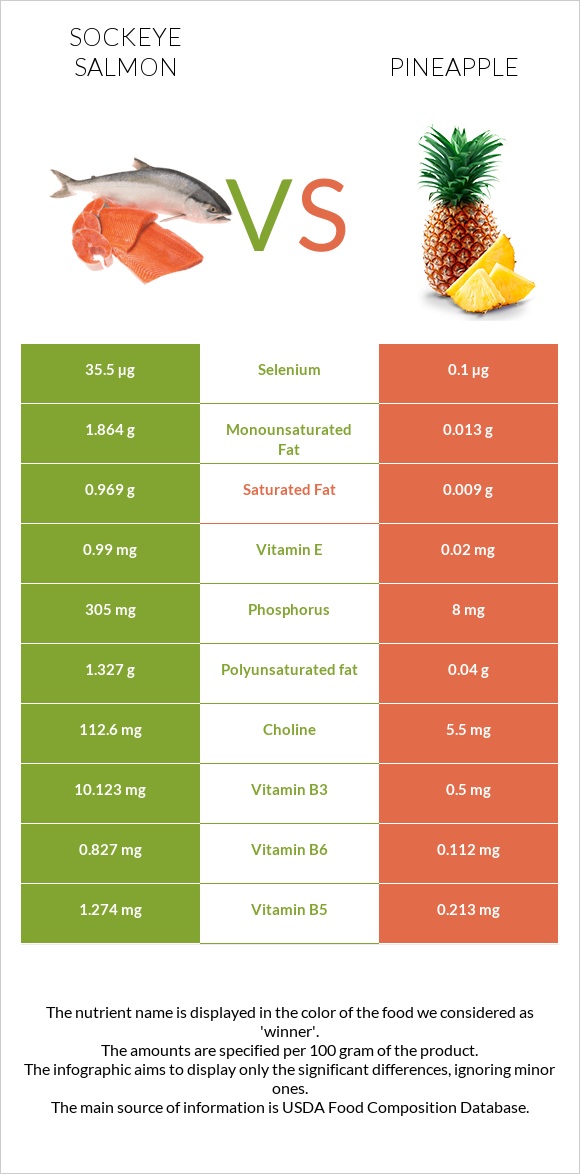Sockeye salmon vs. Pineapple — In-Depth Nutrition Comparison
Compare
Important differences between sockeye salmon and pineapple
- Sockeye salmon has more vitamin B12, vitamin D, selenium, vitamin B3, vitamin B6, phosphorus, and vitamin B5; however, pineapple has more vitamin C and manganese.
- Sockeye salmon's daily need coverage for vitamin B12 is 186% more.
- Pineapple is lower in cholesterol.
- Pineapple has a higher glycemic index than sockeye salmon.
The food varieties used in the comparison are Fish, salmon, sockeye, cooked, dry heat and Pineapple, raw, all varieties.
Infographic

Infographic link
Mineral Comparison
Mineral comparison score is based on the number of minerals by which one or the other food is richer. The "coverage" charts below show how much of the daily needs can be covered by 300 grams of the food.
| Contains more MagnesiumMagnesium | +200% |
| Contains more PotassiumPotassium | +300% |
| Contains more IronIron | +79.3% |
| Contains more ZincZinc | +358.3% |
| Contains more PhosphorusPhosphorus | +3712.5% |
| Contains more SeleniumSelenium | +35400% |
| Contains more CalciumCalcium | +18.2% |
| Contains more CopperCopper | +44.7% |
| Contains less SodiumSodium | -98.9% |
| Contains more ManganeseManganese | +7030.8% |
Vitamin Comparison
Vitamin comparison score is based on the number of vitamins by which one or the other food is richer. The "coverage" charts below show how much of the daily needs can be covered by 300 grams of the food.
| Contains more Vitamin AVitamin A | +1833.3% |
| Contains more Vitamin EVitamin E | +4850% |
| Contains more Vitamin DVitamin D | +∞% |
| Contains more Vitamin B1Vitamin B1 | +98.7% |
| Contains more Vitamin B2Vitamin B2 | +668.8% |
| Contains more Vitamin B3Vitamin B3 | +1924.6% |
| Contains more Vitamin B5Vitamin B5 | +498.1% |
| Contains more Vitamin B6Vitamin B6 | +638.4% |
| Contains more Vitamin B12Vitamin B12 | +∞% |
| Contains more Vitamin CVitamin C | +∞% |
| Contains more Vitamin KVitamin K | +600% |
| Contains more FolateFolate | +157.1% |
All nutrients comparison - raw data values
| Nutrient |  |
 |
DV% diff. |
| Vitamin B12 | 4.47µg | 0µg | 186% |
| Vitamin D | 670 IU | 0 IU | 84% |
| Vitamin D | 16.7µg | 0µg | 84% |
| Selenium | 35.5µg | 0.1µg | 64% |
| Vitamin B3 | 10.123mg | 0.5mg | 60% |
| Vitamin B6 | 0.827mg | 0.112mg | 55% |
| Vitamin C | 0mg | 47.8mg | 53% |
| Protein | 26.48g | 0.54g | 52% |
| Phosphorus | 305mg | 8mg | 42% |
| Manganese | 0.013mg | 0.927mg | 40% |
| Vitamin B5 | 1.274mg | 0.213mg | 21% |
| Cholesterol | 61mg | 0mg | 20% |
| Choline | 112.6mg | 5.5mg | 19% |
| Vitamin B2 | 0.246mg | 0.032mg | 16% |
| Potassium | 436mg | 109mg | 10% |
| Polyunsaturated fat | 1.327g | 0.04g | 9% |
| Fats | 5.57g | 0.12g | 8% |
| Vitamin B1 | 0.157mg | 0.079mg | 7% |
| Magnesium | 36mg | 12mg | 6% |
| Fiber | 0g | 1.4g | 6% |
| Vitamin A | 58µg | 3µg | 6% |
| Vitamin E | 0.99mg | 0.02mg | 6% |
| Calories | 156kcal | 50kcal | 5% |
| Monounsaturated fat | 1.864g | 0.013g | 5% |
| Carbs | 0g | 13.12g | 4% |
| Copper | 0.076mg | 0.11mg | 4% |
| Zinc | 0.55mg | 0.12mg | 4% |
| Sodium | 92mg | 1mg | 4% |
| Saturated fat | 0.969g | 0.009g | 4% |
| Iron | 0.52mg | 0.29mg | 3% |
| Folate | 7µg | 18µg | 3% |
| Fructose | 0g | 2.12g | 3% |
| Vitamin K | 0.1µg | 0.7µg | 1% |
| Net carbs | 0g | 11.72g | N/A |
| Calcium | 11mg | 13mg | 0% |
| Sugar | 0g | 9.85g | N/A |
| Trans fat | 0.023g | 0g | N/A |
| Tryptophan | 0.335mg | 0.005mg | 0% |
| Threonine | 1.247mg | 0.019mg | 0% |
| Isoleucine | 1.274mg | 0.019mg | 0% |
| Leucine | 2.185mg | 0.024mg | 0% |
| Lysine | 2.574mg | 0.026mg | 0% |
| Methionine | 0.858mg | 0.012mg | 0% |
| Phenylalanine | 1.086mg | 0.021mg | 0% |
| Valine | 1.461mg | 0.024mg | 0% |
| Histidine | 0.711mg | 0.01mg | 0% |
| Omega-3 - EPA | 0.299g | 0g | N/A |
| Omega-3 - DHA | 0.56g | 0g | N/A |
| Omega-3 - DPA | 0.093g | 0g | N/A |
| Omega-6 - Eicosadienoic acid | 0.019g | N/A |
Macronutrient Comparison
Macronutrient breakdown side-by-side comparison
Protein:
26.48 g
Fats:
5.57 g
Carbs:
0 g
Water:
67.33 g
Other:
0.62 g
Protein:
0.54 g
Fats:
0.12 g
Carbs:
13.12 g
Water:
86 g
Other:
0.22 g
| Contains more ProteinProtein | +4803.7% |
| Contains more FatsFats | +4541.7% |
| Contains more OtherOther | +181.8% |
| Contains more CarbsCarbs | +∞% |
| Contains more WaterWater | +27.7% |
Fat Type Comparison
Fat type breakdown side-by-side comparison
Saturated fat:
Sat. Fat
0.969 g
Monounsaturated fat:
Mono. Fat
1.864 g
Polyunsaturated fat:
Poly. Fat
1.327 g
Saturated fat:
Sat. Fat
0.009 g
Monounsaturated fat:
Mono. Fat
0.013 g
Polyunsaturated fat:
Poly. Fat
0.04 g
| Contains more Mono. FatMonounsaturated fat | +14238.5% |
| Contains more Poly. FatPolyunsaturated fat | +3217.5% |
| Contains less Sat. FatSaturated fat | -99.1% |





